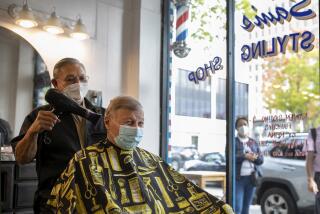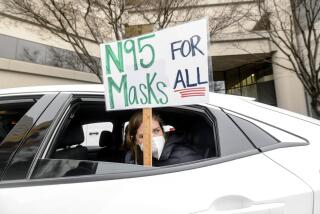Panicking might work in zombie films, but it’s making coronavirus worse for everyone

- Share via
With the coronavirus spreading throughout the U.S., Americans are reacting in a variety of ways. Some of them are smart, others … not so much.
Staying away from big crowds, stocking up on prescription medication and food in case of in-home isolation and washing hands frequently are all wise in the face of a pandemic that is spread through virus-laden droplets sneezed or coughed by sick people.
On the other hand, hoarding enormous quantities of toilet paper, crates of bottled water or five-year supplies of hand sanitizer as if the end is nigh is irrational and unhelpful to your fellow citizens. For one thing, public health experts say the best way to clean germy hands is to wash them with soap and water. It could also be counterproductive to deny hand sanitizer to others, who could use it to avoid spreading the infection to you. And even though the virus isn’t going away tomorrow, medicine to treat coronavirus infections is expected in the coming months. A vaccine could be ready sometime next year.
And then there are simply idiotic and selfish reactions, such as stealing stocks of medical facemasks from hospitals and research facilities, as has been reported in the United States. The nation already has a woefully inadequate supply of facemasks, and taking protective gear away from those who work with sick people endangers everyone.
Panicking in the face of pandemic might make sense in a fictional zombie apocalypse, where 100% of those infected turn into flesh-eating monsters, but this kind of selfish and irrational behavior could very well make the coronavirus outbreak worse for everyone else.
Of course, people should be concerned and take extraordinary-but-rational precautions to avoid coming down with COVID-19 — for themselves, but also for others in the community who are at higher risk for serious illness or death, such as elderly people and those with underlying health conditions. And it’s true that health officials have good reasons to be more alarmed by the new virus than the seasonal influenza, despite the fact that the former is responsible for far fewer deaths this year than the latter. But the reality is that the vast majority of people who get infected will have moderate, mild or even no symptoms. There’s simply no good reason for the masses to freak out.
As testing ramps up after a troubling delay, the number of confirmed cases will most likely rise quickly. Same with the global death toll. As this happens, people need to hold their panic level in check.
This means:
Not demanding diagnostic tests from health care providers if you are well and have had no known contact with a sick person. The U.S. has a shortage of testing kits, and priority should be given to those showing signs of illness or with documented exposure, not to nervous germaphobes.
Not buying into “miracle cures,” such the drinkable silver concoction that televangelist Jim Bakker has been hawking on his show that he claims can cure people of a COVID-19 infection in 12 hours. It can’t; in fact, no cure has been found. There’s got to be a special place in hell for those who are profiteering from this outbreak.
Being skeptical of home remedies shared by friends that supposedly offer protections from infection, such as a shaving off facial hair (a myth that stemmed from respiratory safety poster for health providers from 2017) or avoiding ice cream and other cold food.
Showing compassion, rather than distrust and disdain, for those who are infected or are self-quarantining to protect the rest of us.
And having patience with state and local government officials who are grappling with difficult decisions and trying to walk the line between complacency and overreaction to protect the community. Does it make sense for an entire county to quarantine, as Italy has done? We will only know in hindsight.
With the stock market seesawing and our usual work or school routines disrupted, it may feel a bit like the end of the world as we know it. It’s not, and we should act accordingly. Be careful, be responsible, but don’t give in to pandemic panic.
More to Read
A cure for the common opinion
Get thought-provoking perspectives with our weekly newsletter.
You may occasionally receive promotional content from the Los Angeles Times.









